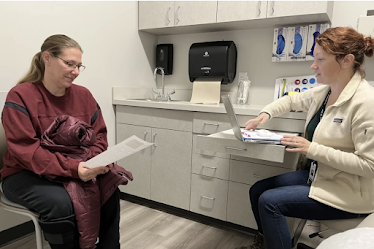 |
| Bonnie Purk, left, meets with nurse practitioner Andrea Storjohann at the Primary Health Care clinic in Marshalltown, Iowa. (Photo by Tony Leys, KHN) |
Buprenorphine, best known by the brand Suboxone, "does not cause the same kind of high as other opioid drugs do, but it can prevent the debilitating withdrawal effects experienced with those drugs," Leys notes. "Without that help, many people relapse into risky drug use.
Such “maintenance treatment” has been done mainly with methadone, but it "is tightly regulated, due to concerns that it can be abused," Leys explains. "Only specialized clinics offer methadone maintenance treatment, and most of them are in cities. Many patients starting methadone treatment are required to travel daily to the clinics, where staffers watch them swallow their medicine."
Such “maintenance treatment” has been done mainly with methadone, but it "is tightly regulated, due to concerns that it can be abused," Leys explains. "Only specialized clinics offer methadone maintenance treatment, and most of them are in cities. Many patients starting methadone treatment are required to travel daily to the clinics, where staffers watch them swallow their medicine."
Federal approval of Suboxone in 2002 helped smaller towns, but physicians have been slow to get certified to prescribe it. Recently, "Federal regulators have made it easier for doctors, nurse practitioners, and physician assistants to become certified," and "have encouraged more front-line health care professionals to prescribe Suboxone and other medications containing buprenorphine." Congress could relax the rules even further in must-pass legislation next week.
The spread of fentanyl has complicated the effort to expand the treatment. Patients "can suffer severe withdrawal symptoms when they begin taking buprenorphine, so health practitioners must be careful when starting the treatment," Leys reports. "In Iowa, officials designated $3.8 million from the state’s initial share of opioid lawsuit settlement money for a University of Iowa program that helps health care providers understand how to use the medications.
Andrea Storjohann, a nurse practitioner in Marshalltown, Iowa, a town of 27,000, works in a repurposed grocery building, with "no signs designating it as a place for people to seek treatment for drug addiction, which is how Storjohann wants it," Leys writes. Until recently, “We were kind of a unicorn in this part of the state, but that is changing,” Storjohann told Leys.
Still, treatment may be hard to find. The public database of providers certified to prescribe buprenorphine treatment "lists only providers who agree to include their names," Leys reports. "Many do not do so. In Iowa, only about a third of providers with the certification have agreed to be listed on the public registry, according to the Iowa Department of Health and Human Services."
No comments:
Post a Comment